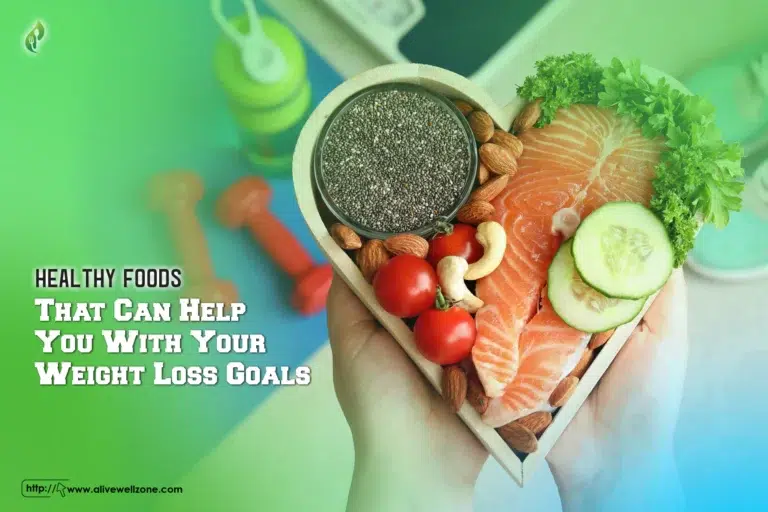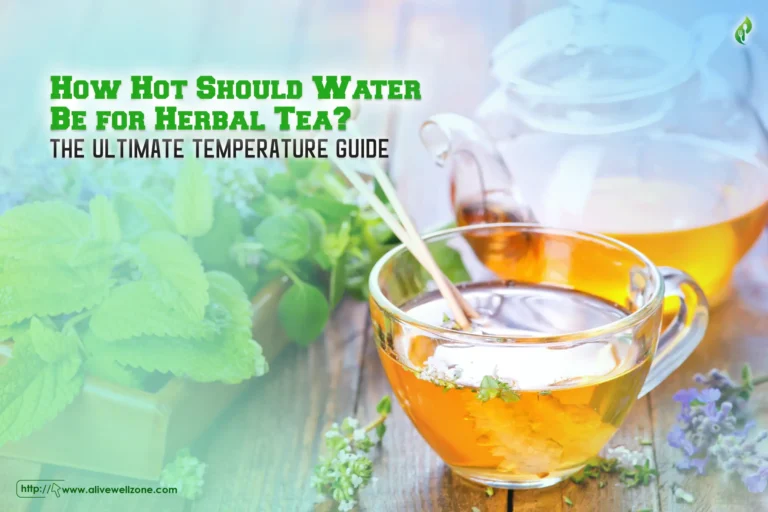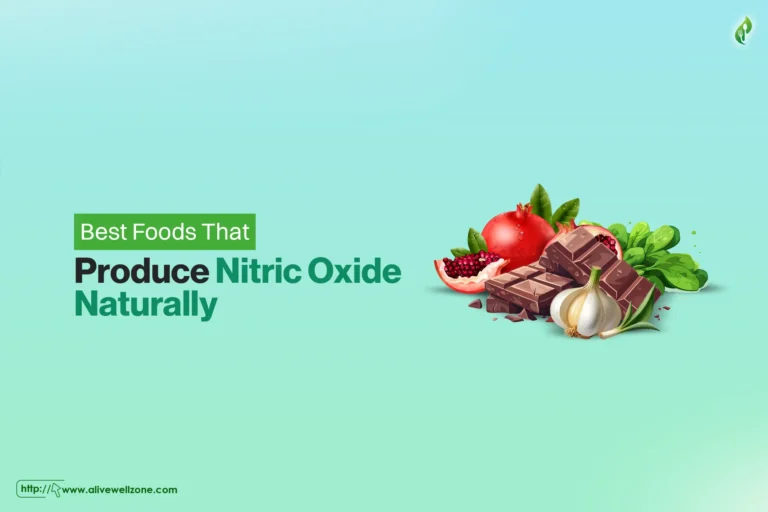
Last Updated on November 8, 2024 by Helena Akter
Feeling helpless as your baby cries inconsolably? Dealing with colic can be heart-wrenching for any parent if not exhausting. Surprisingly, your diet might help to calm down your baby.
And for that reason you must know about the foods to eat while breastfeeding to avoid colic.
You should focus on staying hydrated with water, and include fruits, vegetables, and lean protein. Plus, opt for calcium-rich foods like dairy (if tolerated) or leafy greens. Most importantly, consult your doctor before making major dietary changes, especially regarding probiotics.
Also, you’ll know about colic symptoms and foods to avoid. Plus, we’ll share practical tips for creating a breastfeeding diet specifically for colic relief. So, keep reading!
Key Takeaways
- Understanding Colic: Colic is a fussy period for healthy babies. They cry a lot (more than 3 hours a day on at least 3 days a week for 3 weeks) for no obvious reason. It often happens in the evenings and can be very frustrating.
- Foods to Eat: Staying hydrated and eating a balanced diet is important. Focus on lean protein (meat, eggs, nuts, beans), calcium (dairy, leafy greens), and fish rich in DHA (healthy fat).
- Foods to Avoid: Some foods might worsen colic in some babies, like dairy, caffeine, gassy veggies (broccoli, cabbage), onions, garlic, spicy foods, and gluten. Try cutting these out for a short time to see if it helps.
- Talk to a Doctor First: Before making big changes to your diet, especially cutting entire food groups, talk to your doctor or pediatrician. They can help you find a safe and effective approach for your baby.
What is Colic?
Colic is when a healthy baby cries a lot for long stretches, for no clear reason. It’s also called infant colic. It can be really tough for parents, but remember it’s temporary and usually gets better around 3 to 4 months old.
Here’s what colic crying might look like —
- More than 3 hours daily, on 3 different days a week, for 3 weeks straight.
- The crying can be intense and nothing seems to soothe the baby.
- It often happens late in the evening or afternoon.
Even though you’re learning your baby’s usual cries for hunger, tiredness, etc., a colicky baby might cry even when everything seems okay.
Does Your Baby Have Colic?
Many babies cry a lot, but colic is different. Here’s how you can tell —
- More than 3 hours daily, on 3 different days a week, for 3 weeks straight. This crying can be intense and sound like screaming.
- Your baby might be fed, clean, and comfortable yet still cries.
- Even when the crying stops, the baby might still seem fussy.
- Crying often happens during the evening or late afternoon.
- Your baby might arch their back, tighten their fists, or tighten up their legs.
- Colic can make it hard for your babies to sleep and eat regularly.
Note: Colic happens in healthy babies, but excessive crying can also be a sign of illness. If you’re worried, see a doctor to rule out other causes.
Foods to Include in a Breastfeeding Mother’s Diet to Avoid Colic
Breastfeeding is amazing, but it can be thirsty work! Your baby drinks a lot of milk between 15 and 40 ounces a day! And that milk comes from you. To keep your body making plenty of nutritious milk, make sure you eat right.
That said, here are the foods you should eat while breastfeeding.
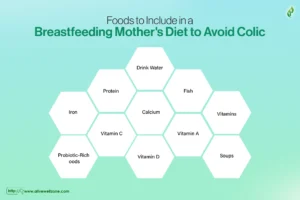
Drink Water
Research suggests your body produces a surprising amount of milk, typically around 750 to 800 milliliters a day, to meet your baby’s needs. Interestingly, breast milk is mostly water, around 87%.
So, aim to drink around 16 cups (128 ounces) a day. It helps your body produce enough milk, keeps you feeling good, and protects you from dehydration’s effects.
On top of that, skip sugary drinks like soda and sports drinks. Because they don’t hydrate you as well. Instead opt for water, vegetable smoothies, or limited amounts of fresh juice.
Coconut water is a great choice. It’s packed with sodium, potassium, and chloride, providing you with natural electrolytes.
Protein
Protein is a vital nutrient for breastfeeding moms! It helps your body produce plenty of healthy breast milk for your growing baby.
So, here are some delicious protein sources to add to your breastfeeding anti colic diet —
- Lean meats and chickens (for instance, 3 ounces of lean beef contain 21gm of protein)
- Eggs (½ cup of scrambled eggs have 12gm protein)
- Nuts and seeds (per ounce, peanuts contain 7gm of protein)
- Legumes like baked beans, lentils, and split peas (8gm of 1 cup of green peas have 8gm of protein)
Calcium
Calcium is a super important mineral for both you and your baby. It helps build strong bones and teeth for your little one, and keeps your own bones healthy too! Adults typically need around 1,000 mg of calcium daily, but breastfeeding moms might need a bit more.
Here are some tasty ways to get enough calcium —
- Dairy Delights: Milk (low-fat or whole), yogurt (plain is best!), and cottage cheese are all packed with calcium.
- Leafy Green: Broccoli, kale, and collard greens are champions of calcium, especially when they’re raw or lightly steamed.
- Fortified Soymilk: Choose brands with around 120 mg of calcium per 100 ml – a great option for those who don’t consume dairy.
Don’t worry if you’re concerned about getting enough calcium. When you stop breastfeeding, your body usually replenishes that calcium from your bones.
Fish
Fish contains DHA, an omega-3 fatty acid that helps with your baby’s brain and eye development. It’s fantastic brain food for both you and your baby! So, aim to eat fish 2 to 3 times a week to boost the DHA in your breast milk.
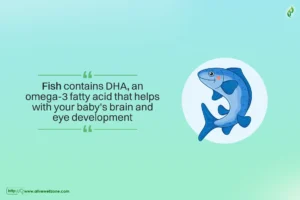
Here are some great choices —
- Salmon
- Bluefish, trout, bass, flounder
- Tuna
Note: Tilefish, shark, swordfish, and king mackerel can be high in mercury, so it’s best to avoid them while breastfeeding.
Iron
Pregnancy can use up your iron stores. Breastfeeding is another time your body needs iron to stay healthy. Here are some yummy ways to get enough iron —
- Red meat, fish, and chicken
- Legumes such as baked beans
- Nuts and dried fruit
- Wholegrain cereals and bread
- Green leafy vegetables
You’ll feel your best while breastfeeding if you eat these iron-rich foods.
Vitamins
Breastfeeding is amazing, but it can also increase your need for certain vitamins to keep both you and your baby healthy. Here are three key ones to focus on —
Vitamin C
Fruits like oranges, berries, kiwi, and even tomatoes are loaded with vitamin C. It helps you stay healthy and increases the vitamin content of your breastmilk for your baby.
Vitamin D
Breastmilk doesn’t have enough vitamin D on its own. So, talk to your doctor about giving your baby a daily supplement of 400 IU to support strong bones and overall health.
Vitamin A
Load up on dark green and yellow veggies like broccoli, carrots, and sweet potatoes. These are brimming with vitamin A, which is vital for your baby’s healthy development.
Probiotic-Rich foods
Did you know your breast milk has bacteria called probiotics? These are good bacteria that keep your baby’s tummy healthy and their immune system strong.
Now, you can increase your baby’s health by adding probiotic-rich foods to your diet. Here are some tasty options —
- Kefir: This tangy drink is like yogurt but with more probiotic power!
- Kimchi: A spicy and a little sour Korean favorite packed with probiotics.
- Sauerkraut: This fermented cabbage adds a delicious crunch to meals and benefits your gut.
- Sourdough bread: This slow-fermented bread is a delicious source of good bacteria.
- Kombucha: This bubbly fermented tea is a trendy way to get probiotics.
Soups
Homemade soup is a delicious and healthy way to stay nourished while breastfeeding. Here’s a simple trick to get even more out of your broth —
Use organic, free-range bones like chicken or beef when making soup. These bones are packed with minerals and calcium, but sometimes your body needs a little help absorbing them.
So, here’s a tip. Add a splash (about 2 tablespoons) of apple cider vinegar to the pot! Vinegar helps draw out good-for-you nutrients from bones, enriching your broth.
Foods to Avoid While Breastfeeding to Prevent Colic in Babies
Breastfeeding is amazing, but sometimes babies get fussy for reasons that can be hard to pinpoint. Colic, which is intense crying for no obvious reason, is one of those challenges.
While there isn’t a sure way to prevent it, some moms find specific foods might affect their baby’s tummy. So, here’s food to avoid for colic when breastfeeding —
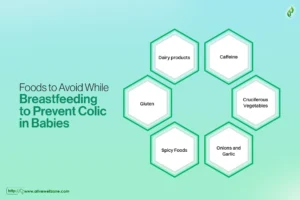
Dairy products
The first one that comes in the foods to avoid while breastfeeding colic is dairy products. There’s a link between colic and milk, cheese, and yogurt.
This is because some babies might be sensitive to proteins found in cow’s milk. If you suspect dairy might be bothering your little one, try cutting it from your diet for a week or two.
See if there’s a change in your baby’s fussiness.
That said, studies published in Pediatrics haven’t found definitive proof that all breastfeeding moms need to avoid dairy. However, if you suspect dairy is causing your baby’s colic, take it out of your diet for a week to see if it helps.
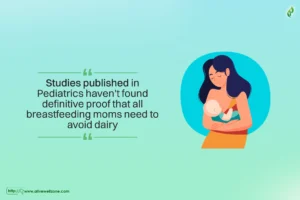
If you decide to ditch dairy, talk to a nutritionist about alternatives like —
- Almond milk
- Cashew milk
- Rice milk
- Oat milk
- Hemp milk
They ensure you’re still getting enough calcium, which is important for both you and your baby.
Remember: Always consult your doctor or pediatrician before making any major dietary changes while breastfeeding.
Caffeine
When it comes to colic foods to avoid while breastfeeding, caffeine can be a tricky one. You should aim for no more than 3 cups of coffee (around 300 mg) a day.
Too much caffeine from coffee, tea, chocolate, or energy drinks can end up in your breast milk. Result? Your fussy little one will get even fussier.
If your baby seems jittery or unsettled after you’ve had some caffeine, try cutting back and see if it makes a difference. Meanwhile, you can opt for a calming herbal tea instead!
Cruciferous Vegetables
Cruciferous vegetables like cabbage, cauliflower, broccoli, and Brussels sprouts are renowned in the nutrition field. However, they can also cause gas in both you and your baby.
You don’t need to ditch them entirely! Just enjoy them in smaller portions and see how your baby reacts. If all goes well, you can slowly increase your intake.
Onions and Garlic
These flavorful vegetables can sometimes affect your breast milk. While it doesn’t happen to all babies, some might experience fussiness or gas.
Best way to find out is to pay attention to your baby’s cues. If you notice a change after eating garlic or onion, try cutting back for a bit and see if it makes a difference.
Spicy Foods
Chilies, curries, and strong spices can change the taste of your breast milk and irritate your baby’s sensitive tummy. It might make them picky or less interested in latching.
Instead of cutting all the flavors, you can start with milder spices. Meanwhile, observe how your baby reacts. Keep in mind that, less is more when it comes to spice while breastfeeding.
Gluten
Gluten, a protein found in wheat, oats, barley, and rye, has sometimes been linked to colic in sensitive babies. But here’s the thing – every baby is different!
If your baby has colic and you suspect gluten might be the culprit, try removing gluten-containing foods from your diet for a couple of weeks. See if there’s a change in your little one’s symptoms.
Remember, this might not be the solution for everyone. But by trying an elimination diet, you can see if gluten is affecting your baby’s comfort.
The Role of Diet in Preventing Colic of Your Baby
Dealing with a fussy baby is hard, and colic can be especially tough. You might have heard about food affecting colic, but the truth is – it’s mixed. Here’s what you need to know —
- Medical Perspectives: There’s no one-size-fits-all answer from doctors. Some say colic is gas-related, while others believe it’s not linked to your diet.
- Mixed Experiences: It varies! Some moms find changing their diet helps, while others see no difference.
- Dairy Cutout: Many mothers find relief by cutting out dairy for a few weeks. It might be worth a try to see if it works for your baby.
- Traditional Advice: Some believe spicy foods, onions, and garlic affect colic, but science isn’t sure.
- Formula Feeding Options: For formula-fed babies, special formulas for sensitive tummies (like Similac Total Comfort or Gentlease) might help.
- Non-Dietary Interventions: Simethicone drops and a warm tummy pad can also be soothing for some babies.
- Consult Your Pediatrician: If you suspect food allergies, discuss an elimination diet with your pediatrician for personalized advice.
Remember, every baby is different. What works for one might not work for another.
Breastfeeding Diet for a Colic-Free Baby
Colic can be frustrating, but there’s no single “colic-free” food for breastfeeding moms. The good news? Eating a healthy, balanced diet is amazing for both you and your baby!
Here are some tips —
- Hydration: Drink plenty of water throughout the day. Breastfeeding moms need to stay hydrated to keep producing milk.
- Nutrient-Rich Foods: Fill your meals with colorful fruits and veggies like zucchini, carrots, lean proteins, etc. (except for gassy ones like broccoli and cabbage).
- Probiotics: Research says probiotics might help your baby’s digestion, but talk to your doctor first, especially if your baby has allergies.
- Probiotic Sources: Yogurt, kefir, kombucha, sauerkraut, and miso are natural sources of probiotics. However, be mindful of dairy, wheat, and soy if your baby has allergies.
- Doctor’s Advice: Always consult your doctor before making big changes to your diet. And it’s especially when considering probiotics or if your baby has allergies.
- Alternative Supplements: If you can’t eat probiotic foods due to allergies, your doctor might recommend a safe probiotic supplement.
Conclusion
We looked at colic and breastfeeding, exploring foods to eat while breastfeeding to avoid colic. While there’s no quick fix, focusing on a healthy, balanced diet is a great first step.
Remember, every baby is unique. What works for one might not work for another. So, don’t hesitate to experiment with different foods while keeping an eye on your baby’s reactions. Ultimately, you should seek advice from your doctor on the best breastfeeding diet.
The good news? Research continues in this area, and the future might hold even more targeted solutions to avoid colic while breastfeeding.
FAQs
Can mother’s diet affect colic?
Yes, what a mother eats can affect colic in breastfed babies. Certain foods like garlic, onions, and beans may increase gas and digestive issues, worsening crying episodes.
What foods cause colic in breastfed babies?
Foods that cause colic in breastfed babies are garlic, onions, cabbage, broccoli, and beans. These can increase gas and digestive issues, leading to more crying episodes.
What should I eat if my baby has colic?
You should eat foods that support a healthy gut if your baby has colic. So, include apples, pears, carrots, kale, bananas, and teas like chamomile and fennel. And avoid trigger foods such as garlic, onions, and beans to help manage colic symptoms.
How do I know if my baby is reacting to something in my breast milk?
To know whether your baby is reacting to something in your breast milk, watch for signs like fussiness, excessive crying, irritability, or skin issues like rashes or eczema. Also, monitor changes after feedings and consult your pediatrician if you notice persistent symptoms.

